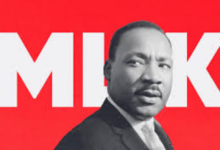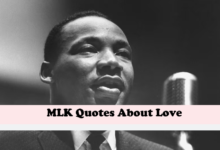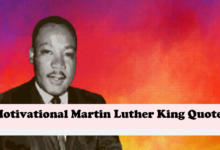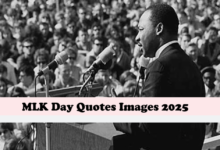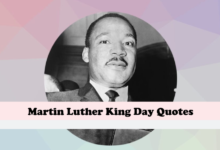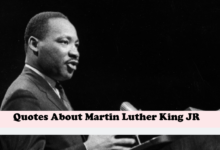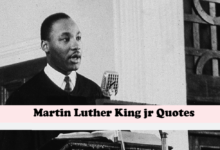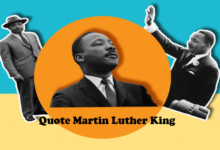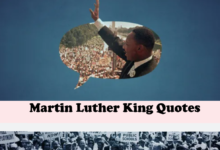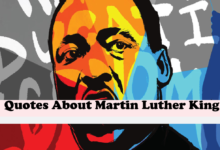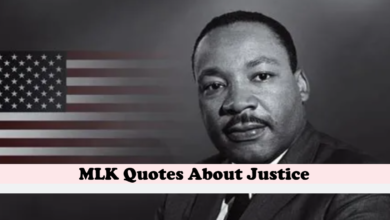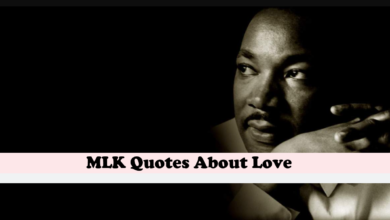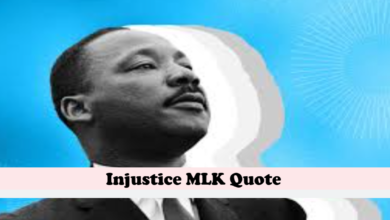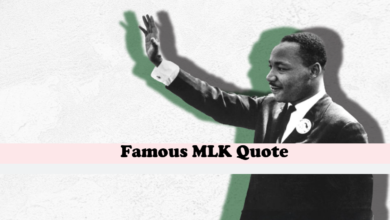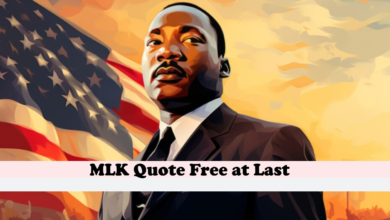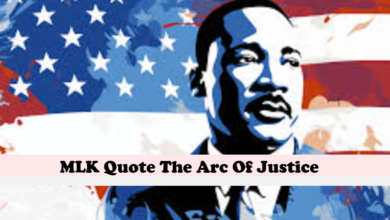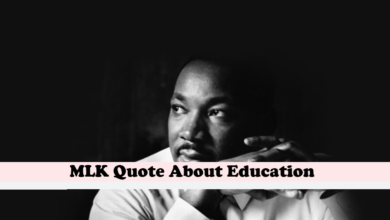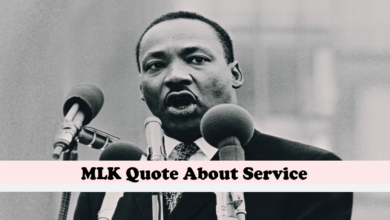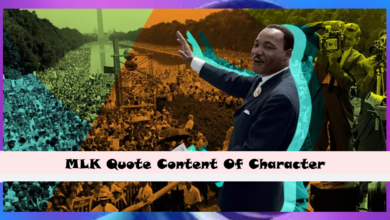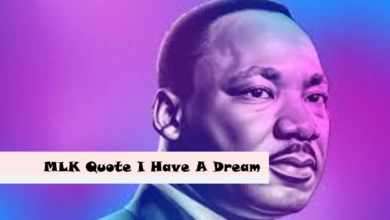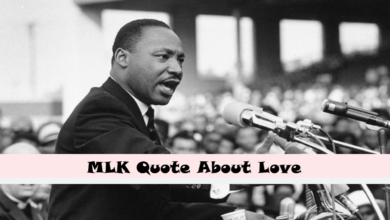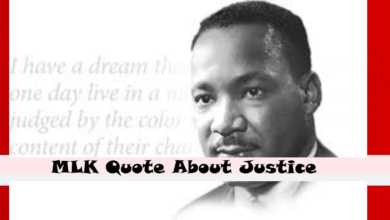MLK Quotes About Peace
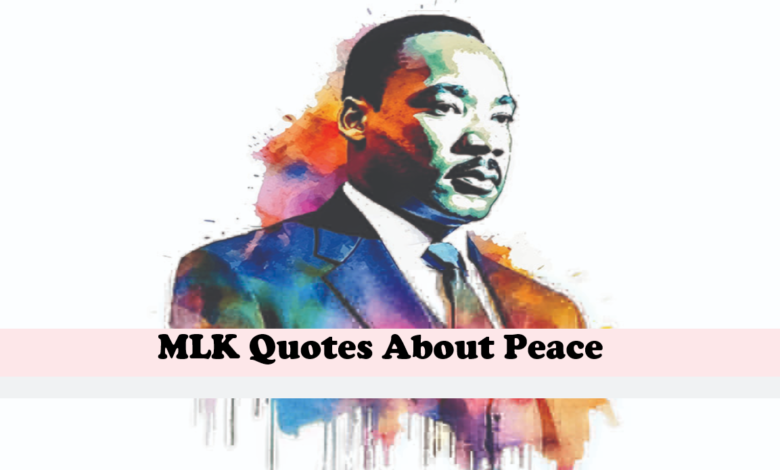
Martin Luther King Jr. is celebrated for his unwavering commitment to justice, equality, and nonviolence. As the foremost leader of the Civil Rights Movement in the 1950s and 1960s, King’s philosophy of peace, deeply influenced by the teachings of Mahatma Gandhi, focused on achieving social change through nonviolent means. His belief that true peace could only be attained through justice became the foundation of his activism and continues to inspire movements for social change around the world.
In this blog post, we will explore some of Dr. King’s most powerful quotes about peace, reflecting on how his philosophy of nonviolence continues to resonate in today’s world. King’s vision of peace was not just the absence of conflict, but the presence of justice, compassion, and brotherhood. These ideals are as relevant today as they were during King’s lifetime, and his words continue to challenge us to create a world where peace is more than just a distant dream.
MLK Quotes About Peace
“I think I have discovered the highest good. It is love.”
“I have decided to stick with love. Hate is too great a burden to bear.”
“Darkness cannot drive out darkness; only light can do that. Hate cannot drive out hate; only love can do that.”
“In some not too distant tomorrow the radiant stars of love and brotherhood will shine over our great nation with all their scintillating beauty.”
“He who hates does not know God, but he who loves has the key that unlocks the door to the meaning of ultimate reality.”
“When I talk about love … I am not talking about emotional bosh. I am not talking about some sentimental or even some affectionate emotion. I am talking about something much deeper.”
“Darkness cannot drive out darkness: only light can do that. Hate cannot drive out hate: only love can do that.”
― Martin Luther King Jr.,
“I have decided to stick to love…Hate is too great a burden to bear.”
― Martin Luther King Jr.
“I have decided to stick to love…Hate is too great a burden to bear.”
― Martin Luther King Jr.
“Our lives begin to end the day we become silent about things that matter.”
― Martin Luther King Jr.
“In the end, we will remember not the words of our enemies, but the silence of our friends.”
― Martin Luther King Jr.
Faith is taking the first step even when you can’t see the whole staircase.”
― Martin Luther King Jr.
“If you can’t fly then run, if you can’t run then walk, if you can’t walk then crawl, but whatever you do you have to keep moving forward.”
― Martin Luther King Jr.
“But I know, somehow, that only when it is dark enough can you see the stars.”
― Martin Luther King, Jr.
“Let no man pull you so low as to hate him.”
― Martin Luther King Jr., A Knock at Midnight: Inspiration from the Great Sermons of Reverend Martin Luther King, Jr.
“There comes a time when one must take a position that is neither safe, nor politic, nor popular, but he must take it because conscience tells him it is right.”
― Martin Luther King Jr., A Testament of Hope: The Essential Writings and Speeches
“Nothing in the world is more dangerous than sincere ignorance and conscientious stupidity.”
― Martin Luther King Jr.
“The ultimate measure of a man is not where he stands in moments of comfort and convenience, but where he stands at times of challenge and controversy.”
― Martin Luther King Jr.
“Intelligence plus character-that is the goal of true education.”
― Martin Luther King Jr.
“Everybody can be great…because anybody can serve. You don’t have to have a college degree to serve. You don’t have to make your subject and verb agree to serve. You only need a heart full of grace. A soul generated by love.”
― Martin Luther King Jr.
“No one really knows why they are alive until they know what they’d die for.”
― Martin Luther King Jr.
“We must come to see that the end we seek is a society at peace with itself, a society that can live with its conscience.”
― Martin Luther King Jr.
1. “True peace is not merely the absence of tension; it is the presence of justice.”
This quote encapsulates King’s fundamental belief about peace. For King, peace was not simply the absence of conflict or violence; it was the presence of justice, fairness, and equality. In a world where systemic racism, poverty, and inequality still exist, the mere absence of violence does not constitute true peace. Instead, King argued that peace can only be achieved when social, economic, and political justice are realized for all people.
King’s words remind us that peace without justice is hollow. True peace requires addressing the root causes of conflict—inequity, oppression, and exclusion—and working to ensure that everyone has access to the same rights and opportunities. This message is particularly pertinent today, as we continue to witness protests and movements for racial justice, economic equality, and human rights around the world.
2. “We must learn to live together as brothers or perish together as fools.”
This powerful call for unity speaks to the heart of King’s vision of peace. King believed that humanity’s future depended on our ability to work together, regardless of race, nationality, or background. His call for brotherhood was not about simply tolerating each other but about embracing our shared humanity and recognizing that our fates are intertwined.
In an era of political division, racial tensions, and global conflict, King’s words are more important than ever. They remind us that peace cannot be achieved through isolation or division; it can only be achieved when we recognize our common humanity and work together to build a more just and equitable world. King’s dream of a “beloved community” was one where people of all races, backgrounds, and faiths could live together in harmony, and this vision continues to inspire efforts for peace and reconciliation.
3. “Peace is not the absence of conflict, but the presence of justice.”
This quote reiterates King’s belief that true peace is inseparable from justice. For King, peace was not a passive state of inaction or silence; it was an active force that required individuals and societies to address the inequalities that perpetuate conflict and division. Only when justice is realized can true peace take root.
King’s philosophy of nonviolence was grounded in the belief that peace must be actively pursued through efforts to rectify social injustices. His advocacy for civil rights and his stance against the Vietnam War were both expressions of his belief that peace could not exist in a world where injustice prevailed. His words challenge us to examine the connections between peace and social justice and to understand that lasting peace can only be achieved when we work to create a world that is fair and just for all.
4. “The time is always right to do what is right.”
King’s call to action in this quote is a reminder that peace and justice require immediate attention and action. Too often, people wait for the “right time” to address issues of inequality, racism, and injustice, believing that change can wait. But for King, the time to act was always now. True peace requires individuals and communities to stand up against injustice, even when it’s difficult or uncomfortable.
This quote speaks to the urgency of creating a more peaceful world. Whether it’s advocating for racial equality, fighting against poverty, or addressing the climate crisis, King’s words urge us to take immediate action to right the wrongs we see around us. Waiting for the “perfect” moment to act will only perpetuate injustice and hinder progress toward peace.
5. “Nonviolence is a powerful and just weapon. It is a weapon unique in history, which cuts without wounding and ennobles the man who wields it.”
Dr. King was a staunch advocate of nonviolence, not as a mere strategy, but as a way of life. He believed that nonviolence was the most powerful weapon for creating change because it was grounded in love, compassion, and respect for all people. Unlike violence, which only begets more violence, nonviolence transforms both the person who practices it and the society in which it is employed.
King’s philosophy of nonviolence was influenced by Mahatma Gandhi’s principles, and it served as the foundation for the Civil Rights Movement. Through peaceful protests, marches, and acts of civil disobedience, King and other activists were able to bring about significant changes, including the end of legal segregation and the passage of civil rights legislation. King’s emphasis on nonviolence continues to inspire movements for justice around the world, showing that peace is not a passive state but an active commitment to change.
6. “I have decided to stick with love. Hate is too great a burden to bear.”
In this quote, King speaks to the personal toll that hatred can have on individuals and society. He recognized that hatred and anger, while often understandable in the face of injustice, ultimately serve to perpetuate the very cycles of violence and division that peace seeks to break. For King, love was the antidote to hate. He believed that love could heal wounds, bridge divides, and bring about true reconciliation.
King’s commitment to love as a force for change was central to his leadership. He saw love not as a sentimental or passive feeling but as an active choice to seek the good in others and to work for the well-being of all people. This message is particularly important in a time when divisions, prejudice, and hatred continue to plague societies worldwide. King’s words challenge us to choose love, even in the face of adversity, as the path toward lasting peace.
7. “Darkness cannot drive out darkness; only light can do that. Hate cannot drive out hate; only love can do that.”
This quote emphasizes the centrality of love and light in the pursuit of peace. King understood that responding to hatred and injustice with more hatred would only escalate violence and division. Instead, he argued that the only way to overcome darkness and hatred was through the transformative power of love and compassion.
In today’s world, where hate crimes, racial violence, and political polarization continue to divide communities, King’s words serve as a powerful reminder that peace cannot be achieved through vengeance or retaliation. Instead, we must respond to hatred with love and work together to build a more inclusive and just society.
8. “We must pursue peaceful ends through peaceful means.”
King’s commitment to nonviolence was not simply about avoiding physical violence but about embodying a deeper principle of peaceful coexistence and mutual respect. He believed that achieving peace required choosing peaceful methods, even in the face of violence, injustice, and oppression.
This quote is particularly relevant in today’s world, where conflicts are often met with violent responses, both domestically and globally. King’s belief in peaceful means as the only path to lasting peace challenges us to consider nonviolent solutions to contemporary issues such as war, political instability, and social unrest.
Conclusion: Martin Luther King Jr.’s Legacy of Peace
Martin Luther King Jr. believed in a vision of peace that went far beyond the absence of conflict. For him, peace was inseparable from justice, love, and the recognition of our shared humanity. His philosophy of nonviolence continues to inspire movements for social change, offering a blueprint for achieving justice and equality in a world often marred by division and conflict.
In 2025, King’s words about peace are as relevant as ever. As we continue to struggle with issues such as racial inequality, economic injustice, and global conflict, his message serves as a reminder that true peace can only be achieved when we choose love over hate, justice over oppression, and nonviolence over violence. King’s vision of peace is not just a dream—it is a call to action, one that challenges us all to work toward a world where peace, justice, and love prevail.
